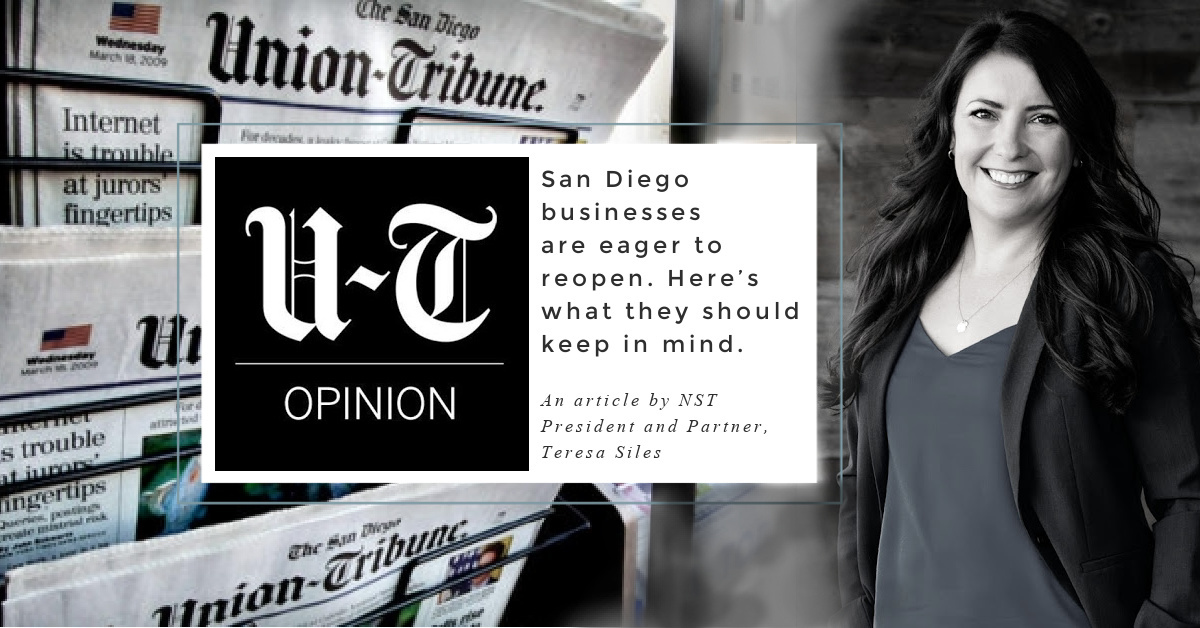The article below originally appeared as an Opinion-Editorial piece by NST President and Partner Teresa Siles in The San Diego Union-Tribune on Wednesday, June 16, 2021.
With the elimination of the tiered system in California and low COVID-19 case rates, San Diego businesses of all stripes are eager to reopen, move on and make way for a better future. While the desires are easily understood, it’s important to learn from the recent past, which offers critical lessons on how to build something all businesses strive for: resiliency.
As a business owner who, with my two partners, acquired a 46-year-old organization on March 13, 2020 — the same day President Trump declared a state of emergency due to the COVID-19 pandemic — I know firsthand that resilient organizations don’t happen by accident. It takes willingness to adopt an innovative and explorative culture, preparedness to pivot to make things better, building empowered teams and a firm commitment to an organization’s values and purpose.
While the COVID-19 pandemic has been called a once-in-a-lifetime event, the world continues to move fast, and game-changing events, technologies and trends can disrupt ill-prepared organizations. The status quo will no longer suffice in an environment where change is the new normal. Winning organizations will take risks, embrace diverse and alternative viewpoints, be willing to break from historical binds not in support of the end game, and tolerate failures in the pursuit of wins.
Preparedness to move quickly and effectively against new strategies and tactics is also paramount. For the most adept, planning cycles will no longer be rigid, annual or at predetermined intervals, but rather ongoing, systemic and built into teams across organizations, all while being guided by an overarching strategic framework for the future. What’s more, small continual improvements go a long way toward organizational betterment, relevance and resiliency.
Just as the pandemic reminded us of the value of friends, family and loved ones, as business owners we too must prioritize our teammates who drive our success. Organizations like ours which historically have had its team within its four walls for 40 hours a week or more had to learn to let go of previous workplace norms and rely on technology to do what once occurred in conference rooms, around water coolers and in team-building activities.
No doubt many organizations were caught technologically flat-footed when it came time to allow employees to work from home. Technology should be the subject of ongoing review and looked at through the lens of not only what does our team need today, but how can we use technology to better inform decision making, improve efficiencies, streamline operations, and better serve our customers and consumers now and in the future.
While technology is an important piece of ensuring teams are set up for success, it’s but one piece of the puzzle. Resilient organizations must also build empowered teams, who must be given the green light to use their skills, talents, gifts and passions to the best extent possible. Leaders must build learning cultures and ensure people have the resources, skills, mentorship and support needed to feel empowered to act, make decisions, think big and stretch the thinking of others.
Lastly, just as the pandemic exposed the fragility of life and prompted personal reflections of values and what drives us as individuals, organizations too must be reminded of their purpose. A clearly defined purpose is critically important, and will be even more so in the future, as consumers, employees and stakeholders continue to desire to associate with — and buy from — brands and companies with a commitment to positively impact society.
Values alignment between stakeholders continues to be meaningful, but espoused values and words alone are no longer enough. Issues of racial injustice and associated civil unrest in 2020 created new calls for action among businesses, organizations and government. Those that don’t go beyond “messaging” to walk the talk will quickly be revealed for their inauthenticity, and fallout, with bottom-line-impacting results, will be inevitable.
There are parts about 2020 that many of us would like to simply forget. That would be a misstep. Rather, let’s learn from it, grow as individuals and organizations, and make ourselves, our businesses and our community even better.
Does your organization need help with a plan for resiliency? Give NST a call today to talk through a tailored approach for your business.

